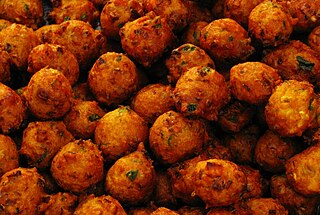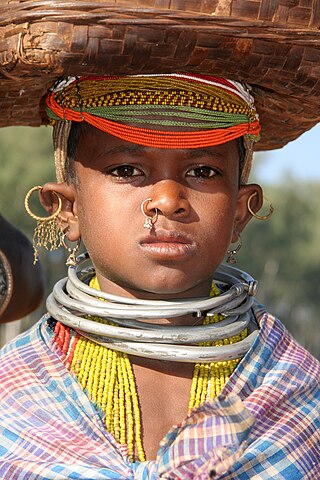Bonda may refer to:
Bonda may refer to:

Bonda is a deep-fried South Indian potato snack that has various sweet and savory versions in different regions. The most common is aloo bonda, and other region-specific variations include potato replaced with sweet potato, tapioca, grated pineapple, green peas, paneer, or other ingredients.

Pakora is a fritter originating from the Indian subcontinent. They are sold by street vendors and served in restaurants in South Asia. It consists of items, often vegetables such as potatoes and onions, coated in seasoned gram flour batter and deep fried.

Puri, also poori, is a type of deep-fried bread, made from unleavened whole-wheat flour, originated from the Indian subcontinent.

Odia cuisine is the cuisine of the Indian state of Odisha. Compared to other regional Indian cuisines, Odia cuisine uses less oil and is less spicy, while nonetheless remaining flavourful. Rice is the staple food of this region. Mustard oil is used in some dishes as the cooking medium, but ghee is preferred in temples. Odia foods traditionally served either on brass, bronze metal plates, banana leaf or disposable plates made of sal leaves.

The Bonda are a Munda ethnic group approximately 12,000 who live in the isolated hill regions of the Malkangiri district of southwestern Odisha, India, near the junction of the three states of Odisha, Chhattisgarh, and Andhra Pradesh.

Pratibha Ray is an Indian academic and writer of Odia-language novels and stories. For her contribution to the Indian literature, Ray received the Jnanpith Award in 2011. She was awarded the Padma Bhushan in 2022.

A bhaji is a type of fritter originating from the Indian subcontinent. It is made from spicy hot vegetables, commonly onion, and has several variants. It is a popular snack food in India and is also very popular in Pakistan. It can be found for sale in street-side stalls, especially in tapris and dhabas. It is also a common starter in Anglo-Indian cuisine across the United Kingdom.
Mahua or Mahuaa may refer to:

Batata vada is a popular vegetarian fast food dish from the Indian state of Maharashtra. The dish consists of a mashed potato patty coated with chickpea flour, which is then deep-fried and served hot with chutney. The vada is typically around two or three inches in diameter. Across different regions of India, this dish is also known as aloo bonda, aloo vada, batata bonda, potato bonda and potato vada.

The Bonda language, also known as Bondo or Remo, is a south Munda language of the Austroasiatic language family spoken in Odisha, formerly known as Southern Odisha, in India. It had 2,568 speakers, all in Odisha, according to the 1951 Census of India, increasing to approximately 9,000 speakers in 2002 according to SIL.

Dr. Haldhar Nag is a Sambalpuri poet and writer from Bargarh, Odisha, India. Popularly known as "Lok Kabi Ratna". He was awarded Padma Shri, the fourth highest civilian award of India by Government of India in 2016. He was born in a poor family of Ghens. He is best known for his work Kavyanjali, an anthology of English translation of Nag's selected poetry which was launched on 2 October 2016. Recently he released his 3rd volume of work on Kavyanjali. In 2019, Haldhar Nag was awarded Doctorate Degree by Sambalpur University. In the year 2020, Professor Jaishankar Babu, Head of the Department of Hindi, Pondicherry University, organized a two-day international seminar under the guidance of its Vice-Chancellor Professor Gurmeet Singh, in which "Haldhar Nag Ka kavya- Sansar" translated into Hindi from Sambalpuri by renowned Hindi writer-transaltor Dinesh Kumar Mali was released and there was an intensive discussion on his poems by the participants from India and abroad. In the year 2021, under the joint editorship of Professor Jaishankar Babu and translator Dinesh Kumar Mali, the book "'Haldhar ke Lok-sahitya par vimarsh'" and the book "Ramayan prasangon par Haldhar ke Kavya aur yugin Vimarsh " translated by Dinesh Kumar Mali based on Ramayana contexts. published from Pandulipi Prakashan, New Delhi.The popularity of these books Hindi Belt honoured Haldhar Nag with Dr Ram Manohar Tripathi Lok Seva Samman on the Silver Jubilee eve of Acharya Mahavir Prasad Dwivedi Smruti Sanrakshan Abhiyan under the leadership of Gaurav Awasthi in the auditorium of Firoz Gandhi College, Rae Bareli on date 12.11.22. The Indira Gandhi National Open University (IGNOU) has included a review of the literary creations of Padma awardee and noted poet Haldhar Nag. According to sources, students pursuing a Master of Arts (MA) in Folklore and Culture Studies will study folk literature by Nag in a course component titled, ‘Folklore: Canon, Multimediality, Interdisciplinarity, and Social Epistemology’ in their second year. The course book has described Nag as the true representative of orality in the present times. His creations have been reviewed in the category, ‘Case study of orality from East India’.“Nag has based his poems on his surroundings. Folklorists and folklore researchers are vulnerable to multiple challenges with regards to archiving, documentation, and dissemination of the folk material,” TOI reported writer Nandini Sahu, who has designed the MA course for IGNOU, as saying. Notably, writer Dinesh K Mali has written a chapter for the MA programme on Nag’s poetry.'

This is a list of snacks common in South India.
Angul is a Vidhan Sabha constituency of Angul district, Odisha, India.

Punugulu(పునుగులు) or Punukkulu is a snack and common street food in Vijayawada, Guntur and a few coastal districts of Andhra Pradesh. Punugulu is a deep-fried snack made with rice, urad dal and other spices. They are often served with peanut chutney, known as palli chutney, coconut chutney, tomato chutney, verusanaga chutney or toordal chutney known as Kandhi Pachadi, or they can be served with capsicum peanut chutney. They are also very popular in Hyderabad.

Vada or Vadai is a category of savoury fried snacks native to India. Vadas can be described variously as fritters, cutlets, or dumplings. Alternative names for this food include vadai, vade, and bada. Vadas are sometimes stuffed with vegetables and traditionally served with chutneys and sambar.

Dambaru Sisa is an Indian politician, social worker and first Bonda Member of Chitrakonda.

Dahibara Aludum is a variant of Dahi vada and originated from Cuttack of the state Odisha. It is a type of chaat (snack) from Cuttack and is popular throughout India. The dish is prepared by soaking vadas in light dahi (yogurt) water which is tempered with mustard seeds and curry leaves. Then adding Aludum and Ghugni to it.

Casearia graveolens is a species of tree in the family Salicaceae, native to an area in Asia from Thailand to South Central China to Pakistan. The plant is used in fishing, fuel, medicine, as a source of non-edible oil, in construction and as food.